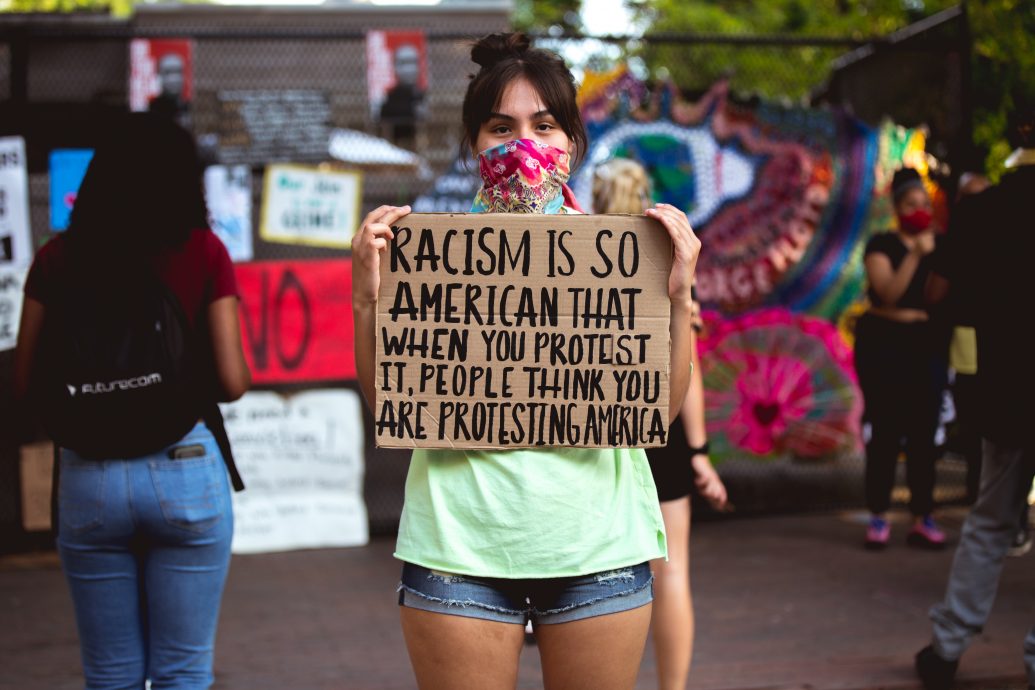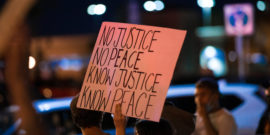Americans have not lost their religion, they have simply relocated their religion to the realm of politics.
Antiracism: An Insidious Path to the Closed Society
We are receiving almost a daily understanding of what a closed society is and what it does to dissenters. The latest revelation came from—where else—The New York Times, a publication that flatters the egos and tastes of our elites and firmly demonstrates the attitudes and postures the new regime demands. They mean to rule us in this regard. Donald McNeil, a nearly four-decade writer for the Times, and a highly regarded science correspondent, was forced out because he committed the new thought crime of merely mentioning a racial slur in the context of trying to understand and analyze a previous racist use of the term by a high school student. He was on a trip with high school students who had inquired of him if he thought it correct that a classmate of theirs who was suspended for using a racist slur should, in fact, have been suspended. McNeil was asking questions and thinking about the incident, trying to gather what had occurred. You might say, he was seeking understanding. But such inquiry is no longer permitted, apparently.
As Theodore Dalrymple recently observed in this space, there is no defense that one can use against the allegation of objective racism, that is, intent and context no longer matter in the determination of a racist allegation. If one is deemed to cause racist offense by a hearer, then perforce, one is a racist. Andrew Sullivan remarked that McNeil’s apology appeared to have been compelled by the Khmer Rouge. I found McNeil’s apology to his fellow writers to be abject and demeaning—to himself—and to any reasonable criteria of fairness and justice.
When such events occur, we must take stock of them. They indicate firmly that a new ideology, a new spiritual meaning, now grips the souls of those living around you, most prominently, academics, journalists, corporate leaders, lawyers, and government bureaucrats.
His personal declaration of sin committed against identity politics is worthy of Rubashov’s final apology in Arthur Koestler’s Darkness at Noon, a 1941 novel widely regarded as one of the truly definitive literary investigations of communist totalitarianism. Rubashov was imprisoned for counterrevolutionary political crimes he allegedly committed against the communist regime. Although we are never told it’s the Soviet Union, the similarities of Rubashov’s interrogation and trial replicate the Stalinist era. However, this old Bolshevik isn’t actually guilty of what he has been accused of. His famous last confession is completely false, and yet it is not simply a lie. He has convinced himself that he owes such an apology to the regime to which he has dedicated his life. In the end, Rubashov cannot disbelieve in the communist regime because of its moral hold on his soul, even though it will execute him for crimes he has not committed against it.
McNeil, too, was finally unable to disbelieve in progressive egalitarian ideology which has now morphed into a nearly totalitarian conception of race and identity. McNeil appended to his execution an apology for objectively offending against the expanding list of identity politics’ crimes. All of this for quoting another person’s words—what neither he nor any sane American until 3 minutes ago believed to be a racist act. When such events occur, we must take stock of them. They indicate firmly that a new ideology, a new spiritual meaning, now grips the souls of those living around you, most prominently, academics, journalists, corporate leaders, lawyers, and government bureaucrats. That these souls are those of our elites, with outsized capabilities of persuasion (or rather indoctrination) and its accompanying cudgel of shame and ostracism, makes our situation that much worse.
McNeil’s putative crimes were only the latest iteration of an ideological putsch that builds on a profoundly errant anthropology, which, in turn, constructs a regime that shapes a world against the human person, family, and community. That anthropology posits that we are projections of race and gender and that we measure everything accordingly. Dismissed is the noble, truly liberal understanding that we are beings of reason, soul, and conscience, and that we are designed to know the truth about ourselves. Consider Thomas Chatterton Williams’s questions in Self-Portrait in Black and White: Unlearning Race: “What does one get in return for subordinating one’s racial or ethnic identity? What is big and powerful enough to fill the identity hole left by the excision of race?” And the answer Williams gives is freedom. But freedom, what is it? What could it possibly mean in the maelstrom of identity politics? Williams looks to James Baldwin who observed in The Fire Next Time:
For the sake of one’s children . . . one must be careful not to take refuge in any delusion—and the value placed on the color of skin is always and everywhere and forever a delusion. I know that what I am asking is impossible. But in our time, as in every time, the impossible is the least that one can demand.
Such freedom is surely not what denizens of identity politics can stand or even contemplate. Rather than moving beyond race to ask themselves what it means to be a human person, they have decided to make race every bit as central to the human person in a manner that an old-line segregationist would understand and appreciate.
Evidence: Ibram Kendi’s basic argument in How to be an Antiracist asserts that one is either racist or antiracist, the latter being a constant struggle for racial equality of outcome against a society filled with racism. Here is the antiracist logic that supports McNeil’s termination: America is suffused with racism, it envelopes minorities, and to even refer to racist terms is to further bury minorities in bigoted ground. Kendi is the leading voice on race, more specifically, anti-racism in America. Consider his definitions.
Racist: One who is supporting a racist policy through their actions or inaction or expressing a racist idea.
Antiracist: One who is supporting an antiracist policy through their actions or expressing an antiracist idea.
Inaction makes one a racist, and falling under that umbrella is the belief in a color-blind society. Kendi’s Carl Schmitt-like pronouncement that you are either a racist or an anti-racist can finally leave no room for being color blind because it “fails to see racism and falls into racist passivity.” There’s also no such thing as a “not-racist.” Why? “It is a claim that signifies neutrality: “I am not a racist, but neither am I aggressively against racism,”” Kendi observes. And we are told “there is no neutrality in the racism struggle.” There is no room for inaction or passivity in the antiracist. To be an antiracist requires enlisting in its crusade by becoming a fulltime ideologue.
But such sheep and goats declarations while mesmerizing to some are hardly new and remain the consistent thread of totalitarian politics: friend versus enemy (Schmitt) or bourgeoisie versus proletariat (Marx). Kendi asserts a racial category of political war-making that will have to be completed before an antiracist future can be ushered into existence. Consider an exhortation from Lenin to get a sense of what Kendi is really doing:
At the root of Communist morality lies the struggle for the consolidation, for the completion, of Communism. Therefore, from the point of view of Communist morality, only those acts are moral which contribute to the building up of a new Communist society.
Compare with Kendi:
The only remedy to resist racist discrimination is antiracist discrimination. The remedy to past discrimination is present discrimination. The only remedy to present discrimination is future discrimination.
This will transform the American political order into a profoundly illiberal one defined by constant conflict. We will be on war-footing.
Kendi knows his Lenin, no?
That struggle requires racial equity—the new buzzword—or equality of result and achievement for all racial groups. It is a constant and never-ending struggle requiring a total commitment of the state to total racial equality. Such equity can be achieved by present and future discrimination against whites, Asian Americans, or any group holding disproportionate wealth, property, professional attainment, educational status, and other markers of success compared to other racial groups. Not considered by the antiracist mind is that disparities in no way equal racism, as Thomas Sowell argued in Discrimination and Disparities (2018). Individual freedom under the rule of law can and will go to hell.
Thus we see a rationale for the Biden administration’s insistence that it will end discrimination against Asian Americans, while at the same time dropping the Department of Justice lawsuit against Yale University for purportedly discriminating against Asian American applicants. Asian Americans already constitute, though, an outsized portion of the student population at Yale relative to their percentage of the broader population. As Kendi would affirm in this context: present discrimination is warranted against Asian Americans because other minority groups have not achieved equity at Yale. Alas, the Biden administration is anti-racist in Kendi’s sense.
Kendi et al., have stated their terms of opposition to the American constitution which as a not-racist document, must be racist. It will have to be either buried or transformed. The liberties and limits of our constitutional order—individual freedom, free markets, the rule of law, religious freedom, civil society, and family—must be radically diminished and, again, transformed in the service of racial equality of result. Neutrality regarding the legal organization of family, education, property, public order, religion, among other matters, isn’t possible. Ultimately, Kendi dictates to us a closed society of racialized socialism.
Will America cross over to antiracism and all its works? I wish the answer were unequivocally no. But those who hold real power in America have joined the antiracist cause with thoughtless abandon.



